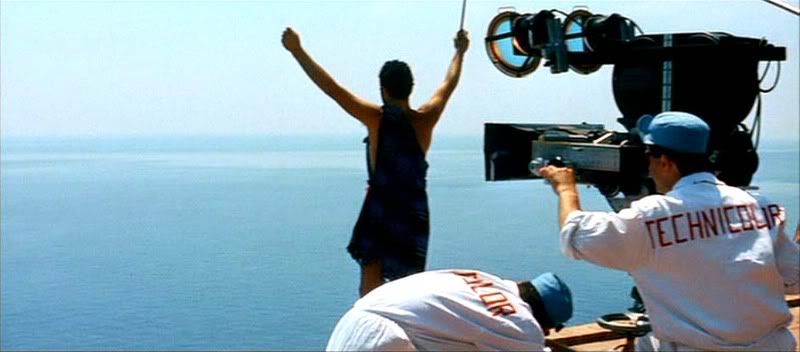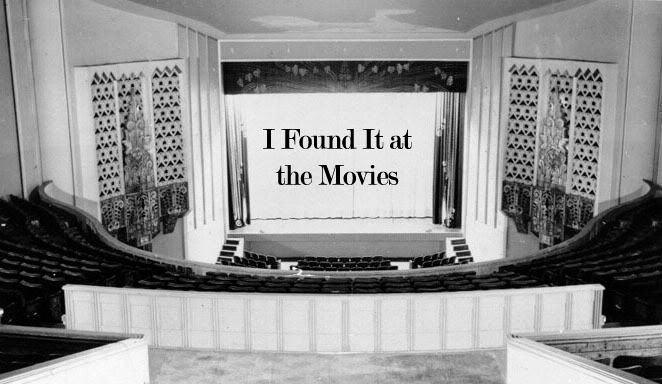
Maddog (a far better nom de guerre for such a discourse, I should think),
You will never find me disagreeing with you when it comes to Weekend. It is the nuclear bomb planted in the heart of pre-'68 narrative cinema, including Godard's own oeuvre. As you, I, and countless Godard enthusiasts (and haters, for that matter) know, the man never returned to that kind of filmmaking again, even after 1980, when Sauve qui peut, la vie (Every Man for Himself) marked his "return" to narrative, whatever the fuck that means.
It's a little difficult to respond to your central complaint, that Contempt is boring. I'll never begrudge anyone of their opinion, but I've never found the film boring. Quite the contrary: Contempt has always been one of the most thrilling and engaging cinematic experiences I have had the pleasure to enjoy. Of course, I won't let myself off the hook so easily.
The "END OF CINEMA" concept is an intriguing entryway for discussing what is going on in Contempt. I'm with you when you key in on that moment as crucial to illuminating the film's stance on art cinema. But rather than side with Paul when he claims, "I don't think the cinema will ever die," Godard seems a bit more measured in his thoughts. I stand by my claim that on a certain level Contempt is an art film in and of itself. But I also think that Godard is being highly critical of what the art cinema can achieve. After all, Fritz Lang may be "worshipped," but Godard certainly does not present what Lang is creating as worthy of such adulation. He is in fact viciously parodying it.
Godard's best work in his early phase encompasses the tension of emotional identification and alienation. Tenderness and Godard's frequent distancing of the audience from that tenderness is what makes his deconstruction of narrative so fascinating. He distances us from Paul and Camille's disintegration through the deadpan comedy of stepping through the hole in the door, or, when Paul interrogates Camille once more about her ceasing to love him, the camera oscillates from one face to another while a lampshade separates the two lovers.
What's more, the idea of what cinema is and whether or not it is approaching an end is more ironic than you initially think. It is not as flamboyantly vicious as Weekend, and that is what distinguishes the two films when it comes to such an idea. Contempt does believe that the "art film" is dying or dead, but it approaches that notion with much more ambivalence than Weekend does. Hence, our emotional engagement with Paul and Camille, even though we are kept at arm's length. Also, the cinematography's intense sensuality, and its integration of the overwhelming power of nature as the backdrop to the film's second half, brings that ambivalence into sharper focus.
But perhaps the thing that gives the whole game away is the implementation of the score by Georges Delerue. It is one of my all-time favorites, both for its elemental qualities and how Godard uses it in the film. It is warm, sensuous, and full of feeling. It aids in engaging a tender, emotional response from the images. But Godard places it in peculiar places, and cuts it off seemingly at random. (For example, the score plays over Lang walking across the studio lot and lighting a cigarrete, a more rote exercise than the score would normally accompany.) We are constantly forced to reconsider what the music is being used for, and why it makes us feel the way we do. Delerue's music embraces "high art," and Godard then tears it up.
We haven't even gotten to how Godard manipulates Alberto Moravia's novel on which Contempt is based, but that could be moot, because I always misremembered you enjoying it. I am curious to hear if we can save Contempt for the end of cinema.
-Evan


1 comment:
Dear Evan and Madelyn,
Evan, thank you for alerting me to the debate between you and Madelyn about CONTEMPT, and for inviting me to comment. As a film professor, it is wonderful to see students continuing serious discussion of film outside the classroom. That said, I must admit to sharing Madelyn’s dislike of CONTEMPT. In part it is because it lacks the playfulness that makes Godard’s early films such a pleasure to watch, in part it’s because of its portentousness, which ruins so many of his later ones. On the latter, what seems so over-blown to me is the significance of Paul and Camille’s break-up. You, Evan, borrow Colin MacCabe’s word “catastrophe” to characterize it. The holocaust was a catastrophe. So was the tsunami of 2004. The fact that these two rather dull, narcissistic characters are breaking up does not seem to me to qualify.
But I will leave the debate about the film’s merits, or lack thereof, to you. Instead, I have a couple of questions that other readers might be asking too. (Please forgive the brevity of the following: I am writing this quickly between seeing students.)
Evan, you opt for the standard interpretation of the film, that it is Godard’s “art film,” but with a twist: that it is “deconstructing” the art film. “Deconstruction” is a fashionable, over-used term that can mean different, often vague things. What do you mean by it here? And, more importantly, why is CONTEMPT deconstructing the art film as opposed to simply being an art film? It cannot only be because Godard is “constantly distancing us from natural emotion,” as you put it. Bresson, Rossellini, Antonioni and others had been doing that for at least a decade before CONTEMPT (VOYAGE TO ITALY, to which CONTEMPT so obviously pays homage, is a paradigm of dedramatization.). Are we to understand them to be “deconstructing” the art film too?
Madelyn, you resort to an idea that has become a cliché of film criticism over the last 20 years: the death of cinema. This, too, can mean a number of different, often vague things, and I am not sure what you mean by it. At one point you refer to the “death of the medium.” At another, rather than the medium as a whole, you seem to refer to a certain type of film--one “in which we can continue to root for the ‘good’ rather than the ‘bad,’ ponder the significance of the danse macabre or the quality of emptiness of the individual, become intimately involved or perversely aligned with the characters whatever their supposed moral qualities, or, say, the universal qualities of hatred, violence, sadness or love.” But what narrative filmmakers and films since the 1960s do not do at least one of the things you list here, including Godard himself (cf a recent film such as IN PRAISE OF LOVE)? It is hard, without concrete examples, to know what sort of film or filmmaker you are referring to when you say a certain type of film has ceased to exist. Elsewhere, you seem to mean the postmodern (another vague, over-used concept) idea of the death of a cinema that believes in “truth.” But what cinema stops believing in truth? Certainly Godard continued to believe in truth long after he made CONTEMPT and WEEKEND: the truth of the labor’s struggle against capital in TOUT VA BIEN, the truth of the Palestinian struggle for liberation in ICI ET AILLEURS, and so on. So did other art cinema filmmakers. Off the top of my head, as Godard was making CONTEMPT, filmmakers such as Miklos Jansco were just beginning to make their films about the truth of political oppression in eastern Europe, filmmakers such as Ousmane Sembene were just beginning to make films about the truth of neocolonialism in Africa, and women filmmakers such as Chantal Akerman were just beginning to make films about the truth of the oppression of women. A cinema that believes in truth was not coming to an end. Quite the contrary, in many ways a new period of cinema focusing on political truths, often referred to as political modernism, was just beginning, and Godard was very much part of it. Nor, in the contemporary cinematic world, is it just Hollywood or indie film that continues to believe in truth, as you suggest. It seems to me that the greatest filmmakers of the last 20 years—Kiarostami, Hou, the Dardennes and so on--continue to do so in their different ways. And, to take a recent example, the Romanian film that won the Golden Palme at Cannes this year, 4 MONTHS, 3 WEEKS, AND 2 DAYS, is very much concerned with the truth of dehumanization under a Communist regime. I am eager to know, therefore, what filmmakers or films you are referring to when you write of a cinema that stops believing in truth, one that Godard’s WEEKEND supposedly presages? Or perhaps I have misunderstood what you mean by the end of cinema. Either way, more clarification with concrete examples would help, for without them it is hard to see that any type of cinema has come to an end or is likely to at anytime soon.
I look forward to reading more of the debate.
Malcolm
Post a Comment